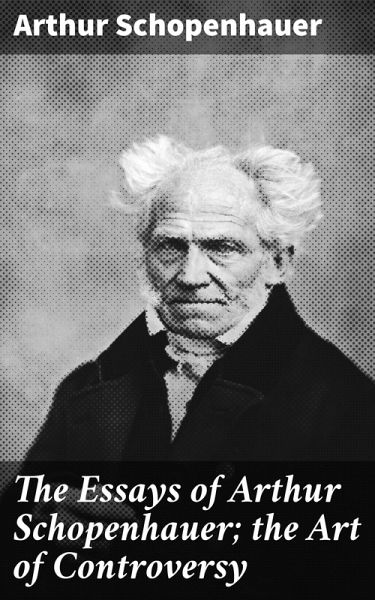
The Essays of Arthur Schopenhauer; the Art of Controversy (eBook, ePUB)
Enriched edition. Mastering the Art of Debate: Strategies for Intellectual Discourse and Persuasion
Kommentar: Merriweather, Fiona / Redaktion: Good Press / Übersetzer: Saunders, T. Bailey
Versandkostenfrei!
Sofort per Download lieferbar
0,49 €
inkl. MwSt.
Weitere Ausgaben:

PAYBACK Punkte
0 °P sammeln!
In "The Essays of Arthur Schopenhauer: The Art of Controversy," Schopenhauer presents a rigorous exploration of argumentative discourse, emphasizing the nuances of rhetoric and the psychological underpinnings of debate. This collection showcases his remarkable ability to dissect human reasoning, employing a distinctive style that merges wit with incisive critique. Schopenhauer's essays are not merely theoretical; they draw inspiration from a rich tradition of philosophy and psychology, positioning his work in the context of 19th-century thought, where he sought to unravel the complexities of h...
In "The Essays of Arthur Schopenhauer: The Art of Controversy," Schopenhauer presents a rigorous exploration of argumentative discourse, emphasizing the nuances of rhetoric and the psychological underpinnings of debate. This collection showcases his remarkable ability to dissect human reasoning, employing a distinctive style that merges wit with incisive critique. Schopenhauer's essays are not merely theoretical; they draw inspiration from a rich tradition of philosophy and psychology, positioning his work in the context of 19th-century thought, where he sought to unravel the complexities of human interaction and the flawed nature of discourse. Arthur Schopenhauer, a pioneering philosopher and a prominent figure in the development of existential and psychological thought, was known for his deep skepticism of human nature and society. His own experiences with controversy and criticism'-stemming from various intellectual rivalries'-sharpened his views on debate and argumentation. Schopenhauer's insights were influenced by preceding thinkers such as Kant and Hegel, as well as Eastern philosophies that encouraged introspection and skepticism. This book is essential for anyone interested in the art of argumentation, philosophy, or psychology. Schopenhauer's profound reflections not only illuminate the mechanics of debate but also serve as a guide for understanding the ethical dimensions of intellectual engagement. Readers will be equipped with tools to navigate discussions more effectively, making this an indispensable read for scholars and laypersons alike. In this enriched edition, we have carefully created added value for your reading experience: - A succinct Introduction situates the work's timeless appeal and themes. - The Synopsis outlines the central plot, highlighting key developments without spoiling critical twists. - A detailed Historical Context immerses you in the era's events and influences that shaped the writing. - An Author Biography reveals milestones in the author's life, illuminating the personal insights behind the text. - A thorough Analysis dissects symbols, motifs, and character arcs to unearth underlying meanings. - Reflection questions prompt you to engage personally with the work's messages, connecting them to modern life. - Hand-picked Memorable Quotes shine a spotlight on moments of literary brilliance. - Interactive footnotes clarify unusual references, historical allusions, and archaic phrases for an effortless, more informed read.
Dieser Download kann aus rechtlichen Gründen nur mit Rechnungsadresse in A, B, BG, CY, CZ, D, DK, EW, E, FIN, F, GR, H, IRL, I, LT, L, LR, M, NL, PL, P, R, S, SLO, SK ausgeliefert werden.













